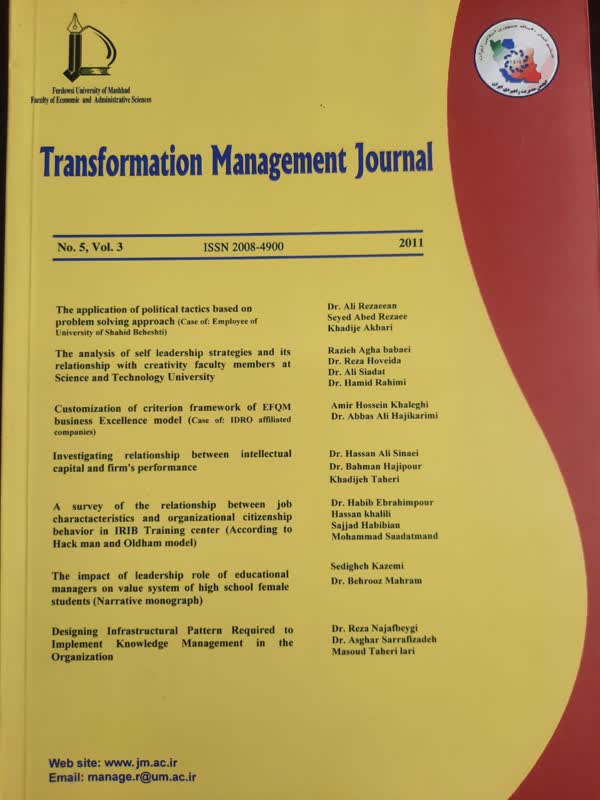Document Type : Articles
Author
Abstract
Leadership is known as the essence of management. The mission of schools as educational institutions is to create a value system for students. According to Graves' theory, each student has his/her own personal value system. In the light of Graves' theory, the main question of this research focuses on how leadership role of educational managers affects students' value system. In this case study, qualitative approach has been selected. Data was collected through the semi scheduled interview with manager and deputy managers of one of the high schools in the city of Mashhad. Observation of the school and random observation of interaction between manager and deputy managers was utilized for collecting complementary data. In order to increase the validity of data collection, various methods including triangulation, participants' revision, recoding by reviewer, and quasi-statistical analysis were used. The result showed that manager’s behavior helps categorize the value system of students under the second, third, and the forth level of Graves' taxonomy. That is, the students' could not get into the value system which is devoted to spirituality, integrity, socio-centrism and logical thinking/wisdom.
Keywords
- Askarian, M. (1997). Organization and education management, Tehran: Amirkabir.
- Ausbrooks, R. (2000). What is school's hidden curriculum teaching your child? [Online].www.Parentingteens.com/Curriculum.shtm!>. [8Aug2001]
- Beran, T. N. (2006). "Preparing teachers to manage school bullying: the hidden curriculum". The Journal of Educational Thought. 40 (2), 119-129.
- Creswell, J. W. (2007). Qualitative inquiry & research design: choosing among five approaches, London: Sage.
- Connelly, M. & Clandinin, J. (2000). Narrative inquiry: experience and story in qualitative, San Francisco: Jossey-Bass.
- Danai Fard, H; Alvani, M. & Azar, A. (2004). Qualitative research methodology in management: a comprehensive approach, Tehran: Safare Eshraghi.
- Dempster, N, & Lizzio, A. (2007). "Student leadership: necessary research", Australian Journal of Education, 51(3), 276-285.
- Duffy, R. D. & Sedlocek, W. E. (2006)."Correlates of open and closed value systems among University students", NASPA Journal [students affairs administrators in higher education]. 43(4), 1-12
- Godarzi, A. & Gaminian, V. (2002). Principles, basics and theories of organizational climate, Esfahan: Jahad Daneshgahi. (in Persian)
- Gronn, D. (2003). "Leadership: who needs it?” School Leadership & Management Journal. 23(3), 267-290.
- Harris, A. (2006). "Opening up the black box of leadership practice: taking a distributed leadership perspective", Leadership and Management. 34(2), 37-45.
- Hoyt, M. A. & Kennedy, C. L. (2008). Leadership and adolescent girls: A qualitative study of leadership development. American Journal of Community Psychology, 42(¾), 203-219.
- Iran Neghade Parizi, M. & Sasan Gohar, P. (2004). Organization and management: from theory to practice, Tehran: High institution of Iran banking. (in Persian)
- Khalife, A. M. (1999). Psychological review of values, Translated by Hasan Seyedi, Mashhad: Behnashr. (in Persian)
- Leonard, P. E. (1999). Inhibitors to collaboration. (Ed). London: Flower begly & leonard the values of educational administration.
- Maxwell, J.A. (2005). Qualitative research designs: an interactive approach, London: Sage.
- Mahram, B. (2005). Hidden curriculum evaluation in higher education: case study: Ferdowsi University of Mashhad, A thesis for the degree of Doctor of curriculum. Shiraz University. (in Persian)
- Ming, Y. W. (2005). An experiential study on the application of narrative in teacher development in Hong Kong, A Thesis for the degree of Doctor of Education. Toronto University.
- Mosa Por, N. (2003). Principles of secondary education planning, Mashhad: publication of Behnashr . (in Persian)
- Moshabaki, A. & Rohani, M. H. (2007). Organizational behavior management, Tehran: Eghbal. (in Persian)
- Monshi, F. (2005). "Effect accepting of students value system of family and school", Journal of Family and Research, 1(1), 136-165.
- Niu, C. P. & Wang, A.C. (2009). "Effectiveness of a moral and benevolent leader: Probing the interactions of the dimensions of paternalistic leadership", Asian Journal of Social Psychology; 12(1), 32-39
- Rosado, C. (2004). Building your team: value systems, memetics and education.www.edchange.org/multicultural/papers/rosado_leadership.pdf [17Nov2009]
- Saeedy Reznani, M. (2001). Uncovering the hidden curriculum in secondary schools' religious education and suggesting some guidelines for its utilization in effective religious education. A thesis for the degree of Doctor of
curriculum. Tarbiat Moalem University. (in Persian)
- Sentocnik, S. & Rupar, B. (2009). "School Leadership of the future", European
Education, 41(3), 7-22.
- Skelton, A. (1997)."Studying hidden curriculum: Developing a perspective in the light of postmodern insights". Curriculum Studies. 5(2), 177-193.
- Shamsian, D. (1992). Values hierarchy of male and female adolescents in Tehran, Articles of third symposium on adolescent and youth education, Tehran: Secretary of position education symposium. (in Persian)
- Shariatmadari, A. (1995). "Principles of secondary education in Iran", Journal of Educational Researches.3, 9-16. (in Persian)
- Shariatmadari, M. (2005). Principles and fundamentals of management, Tehran: Kohsar. (in Persian)
- Smith, P. J. (1995). Philosophical mind in educational management, translated by Mohamad Reza Behrangi, Tehran: Kamale Tarbiat. (in Persian)
- Shokohi, Gh. H. (1984). Education and its stages, Mashhad: Behnashr. (in Persian)
- Soltan Gharai, Kh. A. (2005). Role of School in the development and growth of moral and social values in adolescent and youth groups. Articles of third symposium on adolescent and youth education, Tehran: Secretary of Position Education Symposium. 254-261. (in Persian)
- Southworth, G. (2002). "Instructional leadership in schools: reflections and empirical evidence", School leadership and management. 22(1), 73-91.
- Tehmina, N. B. (2003). "Manual or electronic? The role of coding in Qualitative data analysis". Educational Research, 45(2), 145-154.
- Vallance, E. (1991). Hidden curriculum, the international encyclopedia of curriculum. New York: Elsevier Science Pub Co.

Send comment about this article